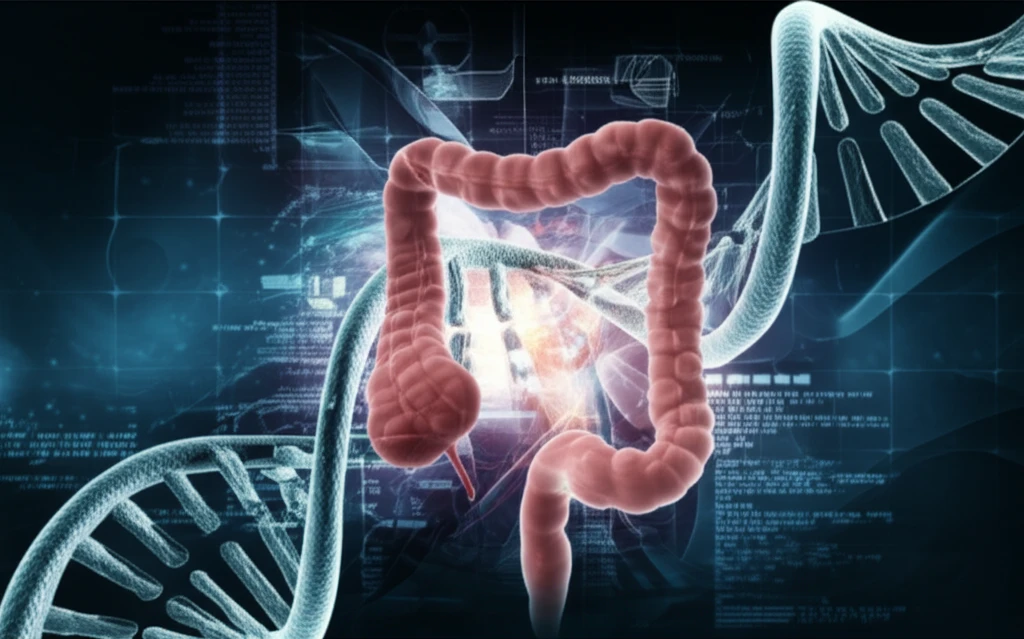
The Gut Gene Gamble: Does UGT1A1 Hold the Key to Colorectal Cancer?
"Unlocking the Secrets of Genetic Variations and Colorectal Cancer Risk"
Colorectal cancer (CRC) is a major health concern, ranking as the third most common cancer in men and the second in women worldwide. While factors like age, family history, diet, and lifestyle choices are known to influence CRC risk, the role of genetics is increasingly under the spotlight. One gene of particular interest is UGT1A1, which plays a crucial role in how our bodies process and eliminate potentially harmful substances.
The UGT1A1 gene is responsible for producing an enzyme that helps to detoxify various compounds, including some that can contribute to cancer development. However, not all UGT1A1 genes are created equal. Variations in the gene, known as polymorphisms, can affect how efficiently the enzyme works. One common polymorphism, called UGT1A128, involves a difference in the number of repeated DNA sequences within the gene's promoter region. This seemingly small change can impact the amount of enzyme produced, potentially altering an individual's risk of developing CRC.
This article delves into a study that investigated the association between the UGT1A128 variant and the characteristics of colorectal cancer. By examining a group of patients with CRC, researchers aimed to determine whether carrying the UGT1A128 variant influences the development of precancerous lesions or specific traits of colorectal tumors. Understanding this connection could refine screening strategies, personalize treatment approaches, and ultimately improve outcomes for individuals at risk of or affected by colorectal cancer.
Decoding UGT1A1: How Gene Variations Influence Colorectal Cancer

The study examined patients treated for colorectal cancer, focusing on the UGT1A128 variant, which has seven TA repeats (TA)7, compared to the most common allele (TA)6. The key question was whether having the (TA)7/(TA)7 genotype was linked to specific colonic features or increased risk of precancerous lesions. Researchers collected data from 292 patients, analyzing their UGT1A1 genotypes and detailed information about their colorectal health.
- Enzyme Activity: Does the UGT1A128 variant's impact on enzyme activity affect how the body processes potential carcinogens in the colon?
- Tumor Location: Could the UGT1A1 genotype influence where tumors develop in the colon?
- NSAIDs and CRC: How might NSAIDs interact with UGT1A1 variants to influence colorectal cancer risk?
Personalizing Colorectal Cancer Strategies: The Future of UGT1A1 Research
While this study didn't establish a direct link between the UGT1A128 variant and colorectal cancer characteristics, it underscores the complexity of genetic influences on the disease. The unexpected finding regarding aspirin use highlights the potential for gene-environment interactions to play a significant role.
Future research should delve deeper into how UGT1A1 variants interact with other genetic and lifestyle factors to influence CRC risk. Exploring the enzyme's activity in relation to different carcinogens and medications could provide valuable insights for personalized prevention and treatment strategies. Additionally, investigating the potential impact of UGT1A1 variants on the effectiveness of chemopreventive agents like aspirin warrants further attention.
As our understanding of UGT1A1 and its role in colorectal cancer evolves, we may move closer to tailoring screening and prevention efforts based on individual genetic profiles. By considering the unique genetic makeup of each person, we can optimize strategies for early detection, personalized treatment, and ultimately, improved outcomes in the fight against colorectal cancer.
